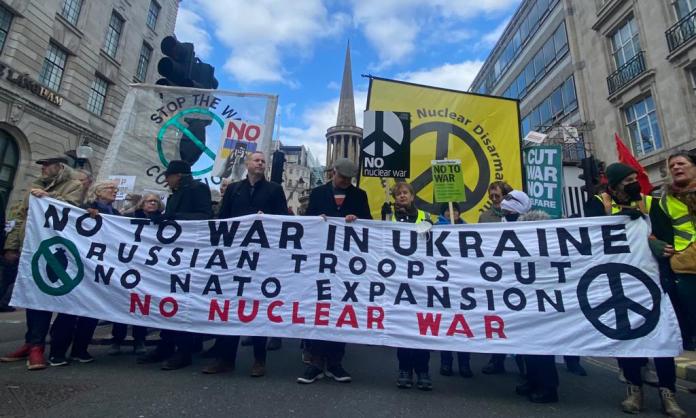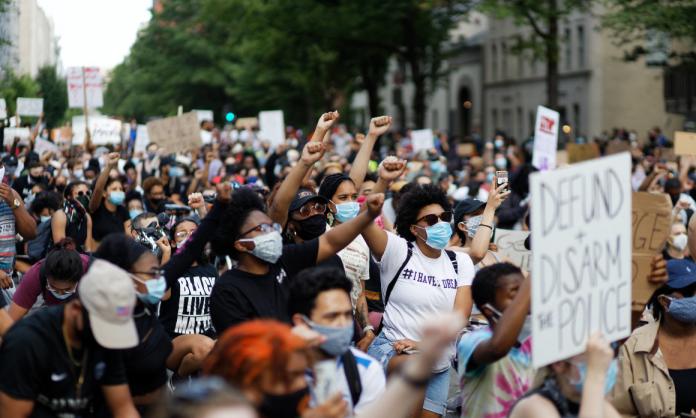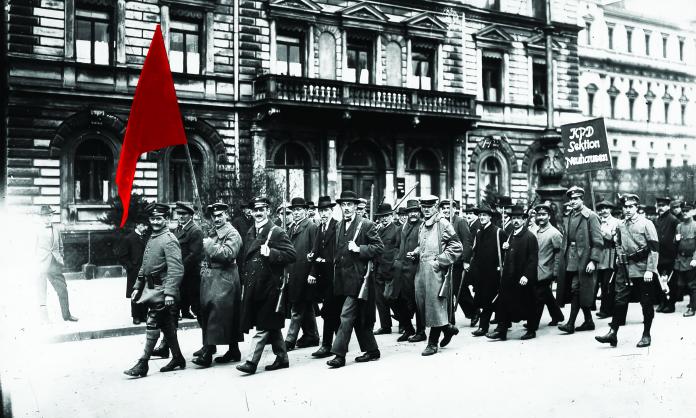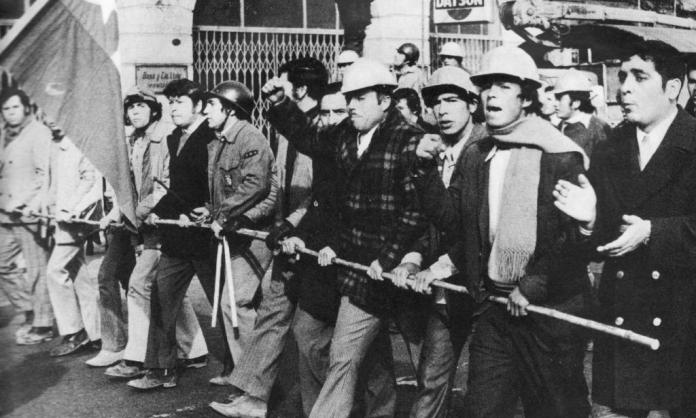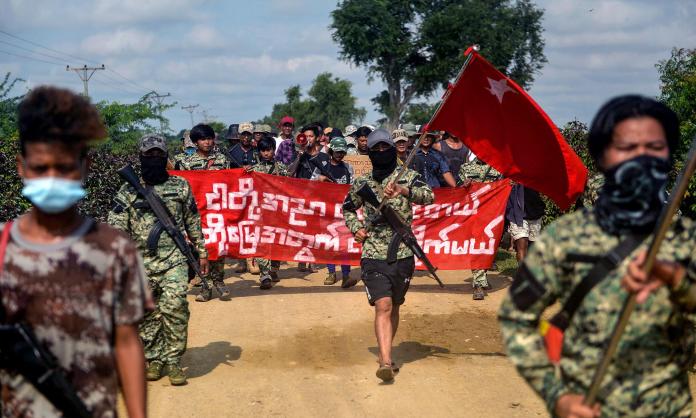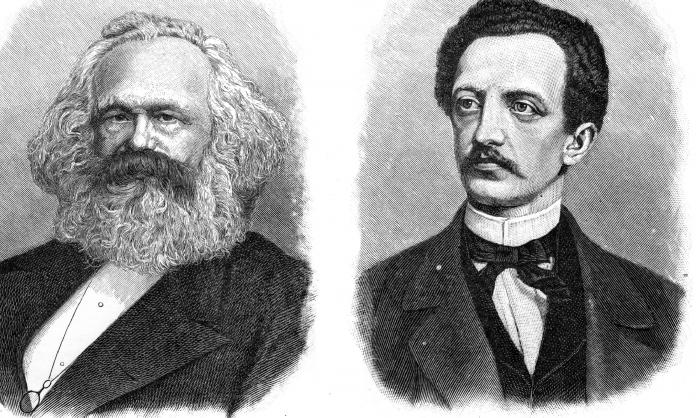This article is a reply to Paul Mason’s “Ukraine: Outlines of a Marxist position”, which was published on 12 March at https://paulmasonnews.medium.com.
It’s a battle between “good” and “evil”, “democracy” versus “authoritarianism”. That is the message being drummed into us day after day by the Western media and politicians regarding the growing imperialist conflict between the US and its Western allies and Putin’s Russia and Xi’s China.
This is not just the message of the right-wing Murdoch press but of all sorts of liberal commentators. Left-wing British journalist Paul Mason, a former Trotskyist, has now joined this chorus.
Mason, who describes himself as a supporter of “radical social democracy” and “Marxist humanism”, argues that the Russian invasion of Ukraine indicates that “the world has entered a systemic conflict between two, allied militarised capitalist dictatorships [Russia and China] and the liberal-democratic West”. He says “it’s time for the left to break with Stalinism for good” and to “take a side” in this “systemic conflict”.
For revolutionary socialists, there is no disputing that Xi’s China and Putin’s Russia are brutal authoritarian regimes and that Putin’s invasion of Ukraine is a thoroughly reactionary war that all leftists and militant workers should oppose. And Mason is right that “Ukraine is fighting a legitimate war of self-defence” against an imperialist invasion.
This does not, however, make the rivalry between Russia and the US a “systemic conflict” between good and evil or between two different social systems. And definitely Putin’s invasion of Ukraine should not lead socialists, as Mason advocates, to call for a “popular front” with capitalist forces in the West and to support European “re-” armament (it is certainly not disarmed at present) and the strengthening of NATO as a “defensive alliance”.
Mason himself acknowledges that both Russia and China are capitalist states. So they are not of a fundamentally different nature to, or more reactionary than, the Western capitalism they are clashing with. And nor are they unique in their authoritarianism. The great majority of states in the world today, including Saudi Arabia, Modi’s India, Singapore, Turkey and Israel, are in no sense liberal democracies. Yet Britain and the US are heavily arming Saudi Arabia to fight a brutal war in Yemen, which has so far killed more people than the Russians have in Ukraine. Turkey, which is butchering the Kurds, is a member of NATO; nuclear-armed India is part of the Quad (the security alliance between the US, Australia, Japan and India); Singapore is on board with the US in the current conflict and nuclear-armed Israel, a key defender of Western imperialist interests in the Middle East, receives copious military funding from the US.
The trope of defence of democracy against authoritarianism is extremely timeworn. The imperialist powers have used it to justify numerous wars. Every tyrant the West falls out with becomes “the new Hitler”. It was the key ideological justification for the long Cold War with Russia. It was an utterly hypocritical posture by a US that backed murderous dictatorial regimes that were suitably anti-Communist in Spain, Portugal, Indonesia, the Philippines, South Vietnam, South Korea, Greece, apartheid South Africa, the Congo and Brazil, and routinely backed the overthrow of democratically elected governments in countries like Chile, Iran and Guatemala.
In World War One, both sides claimed they were defending Western civilisation against authoritarian reaction. The Germans argued that they were fighting a glorious struggle against the barbarous Asiatic despotism of tsarist Russia. Britain and France claimed to be fighting for freedom against heinous Prussian militarism.
But revolutionary socialists like Rosa Luxemburg and Vladimir Lenin rightly argued that workers had nothing to gain from supporting either side in that imperialist war for markets, profits and colonies. All the talk of “freedom” and “civilisation” is cover to hide their murderous pursuit of wealth and power at the expense of millions of working-class lives.
Putin’s Russia is undoubtedly a vicious police state and a brutal imperialist power. However, some sense of proportion is necessary when it comes to assessing both the military might and the totalitarian nature of the regime. We are not dealing with Nazi Germany or Stalin’s USSR.
Putin’s armies are in absolutely no position to launch a Nazi-style blitzkrieg that sweeps across Western Europe. In fact, Russia’s conventional forces are nowhere near powerful enough to re-establish the old Warsaw Pact bloc. They have been bogged down even subduing a terribly poor country like Ukraine.
Putin does of course have a vast array of nuclear weapons that he might be desperate enough to unleash if his regime was seriously threatened. However, more military spending by an already nuclear-armed NATO is not going to prevent this. The left needs to build a mass popular movement like the old Campaign for Nuclear Disarmament in both the East and West to challenge that danger, not campaign for more NATO guns.
Repression has intensified and is likely to get a lot worse against the left and other opposition forces in Russia. These forces deserve our full support for their heroic stand against the invasion of Ukraine. However, a popular front with capitalist forces in the West and the strengthening of NATO will do nothing to advance the position of the left and working-class forces inside Russia. A movement from below has to be built to overthrow Putin.
The same goes for China. It is class struggle from below, no matter how difficult the circumstances, that offers the only way forward, not more Western guns. Except for a few crocodile tears for the Uyghurs and the Tibetans, the West has been more than happy to tolerate the intense repression meted out by the Chinese state. Indeed, many Western companies with investments in China have depended on it to make their huge profits.
Mason rather gilds the lily when it comes to the degree of “attachment to the rule of law, science, democratic process and universal human rights” of the Western ruling classes. There has been a long-term shift to more authoritarian forms of rule in Western countries, with power increasingly concentrated in the executive arm of the state.
There is widespread use of state surveillance measures (the US and China have roughly the same number of CCTV cameras per person and the US’s database for fingerprint and criminal history is far more sophisticated and centralised). Police forces are increasingly militarised. This authoritarian trend was sharply accelerated with the implementation of draconian anti-terror laws following the 9/11 attacks.
As for the West’s supposed commitment to “universal human rights”, do we need to remind ourselves of the brutal war against refugees? The merciless approach of Australian governments, both Liberal and Labor, in turn inspired “fortress Europe”, which led to mass drowning of refugees in the Mediterranean Sea.
The commitment of the US Republican Party, one of the two most powerful political parties in the Western world, to “democratic process” is virtually non-existent. As for the attachment of the Western elite to “science”, they have largely ignored it when it comes to climate change, the handling of the COVID-19 pandemic and their pandering to myriad forms of irrationalism. The growth of powerful far right forces in the West indicates that fascist rule is more likely to be imposed by domestic reactionary forces than by an invasion by Russia or China.
It is not as though Mason has not noticed and opposed these dangerous developments. He has campaigned against the rise of fortress Europe and has recently published a book, How to stop fascism: History, Ideology, Resistance, that correctly argues that the left needs to take these threats seriously. However, his strategy for defeating the right is a seriously flawed one: an alliance between left-wing working-class forces and sections of the capitalist class and their parties—a new Popular Front. In a 2019 Guardian article, Mason argued that the Popular Front was the “one proven response in history that beats an alliance of far-right populists and conservative amoralists”.
He makes a similar claim in his book How to stop fascism, writing that the Popular Fronts of the 1930s in countries such as France and Spain constitute “the only historical example of democracies effectively defending themselves against a significant fascist threat”.
Mason says he is for the left breaking entirely with “Stalinism as a way of thinking”. But he significantly overstates the influence of Stalinist and campist pro-Putin apologists on the Western left. In most countries, their forces are minimal, and the overwhelming majority of social democrats and Greens have solidly lined up behind Western imperialism.
But in any case, the Popular Front policy was itself the centrepiece of Stalinist Communist Party politics from the 1930s onwards, and has left a profoundly reactionary legacy for today’s left. To genuinely break with Stalinism, the left needs to abandon all forms of popular frontism and class collaboration.
The Popular Fronts of the 1930s in Spain and France did not stop fascism. They facilitated its triumph. In Spain, General Franco’s fascist military coup of 1936 was confronted by an armed working-class uprising. In the key industrial centres, such as Barcelona, revolutionary workers crushed the fascists and took power into their own hands. But the Communist Party-backed Popular Front government was more terrified by this working-class challenge to capitalist rule than by the prospect of a fascist victory. The Popular Front Republican government, with the backing of the Communist Party, moved to disarm the worker militias that had driven back Franco’s fascists, and the Stalinists systematically murdered their revolutionary socialist and anarchist opponents. With the revolution crushed and workers demoralised, resistance to Franco’s armies collapsed.
In May 1936 in France, a Popular Front composed of the Communist Party, the Socialist Party and the liberal capitalist Radical Party was swept into office. Workers unleashed a massive wave of strikes and workplace occupations. But the Communist Party, loyal to the Popular Front, used all its influence to get workers back to work and producing profit. With the strikes over, the Popular Front moved substantially to the right, cracking down on working-class militancy.
In 1939, the Popular Front government that the Communists had been so central to creating outlawed the Communist Party. Indeed, the same Popular Front parliament elected in 1936 went on to vote support for the pro-fascist Vichy government.
In Britain and Australia in these years, the Communists’ Popular Front orientation meant that they were commonly to the right of the Labor Party. They denounced Labor as “sectarian” for running candidates against “progressive” Tories and liberal capitalists. At the end of World War Two, the British party even called on Labour to form a Popular Front with the arch-reactionary Winston Churchill.
Subsequently, the Stalinist Popular Front approach led to defeats for the working class and the left in France, Chile, Iran, Brazil, Iraq, Palestine, India and Indonesia. And in Italy, which had the largest Communist Party in the Western world, the Communists made a compromise with the Christian Democrats, the main party of Italian capitalism.
Mason’s Popular Front approach leads him to the absurd proposition that the Western left should campaign to “redesign NATO as a defensive-only alliance, with clear limits to ‘out of area’ operations, and to democratise the professional, right-wing dominated security and military machines of the West”. This is to go along with “strategic autonomy” and a rearmed Europe that is “self-sufficient in food, energy and military technology”.
This is fantasy-land reactionary stuff. There is no way that a yet more heavily armed alliance of the great powers—the US, Britain, France and Germany—will ever confine itself to purely defensive operations. That would be to defy the whole logic of capitalism, the very essence of which is the competitive accumulation of capital that leads corporations to push outwards for new markets and sources of raw materials, new arenas for profitable investment and for new supplies of labour to exploit.
To safeguard their investments, markets, trade routes and profits, capitalist companies need the backing of well-armed states. That inevitably leads to the threat or actuality of imperialist war. The imperialist system cannot simply be reformed to make it a peaceful one. The only solution is a root-and-branch transformation. The rule of the capitalist class needs to be broken by a working-class revolution that places power into the hands of the great majority of humanity.




